The agricultural industry has seen a lot of changes in recent years, and one of the most significant has been the increased use of technology and machinery. Farmers are now using machines to do everything from planting and harvesting to spraying and irrigation. While this machinery can be a big help in productivity, it also comes with its own challenges. One of the biggest is managing all the machines that are now being used on the farm. In this post, we will go through some of the challenges of farm machinery management and offer tips on overcoming them.
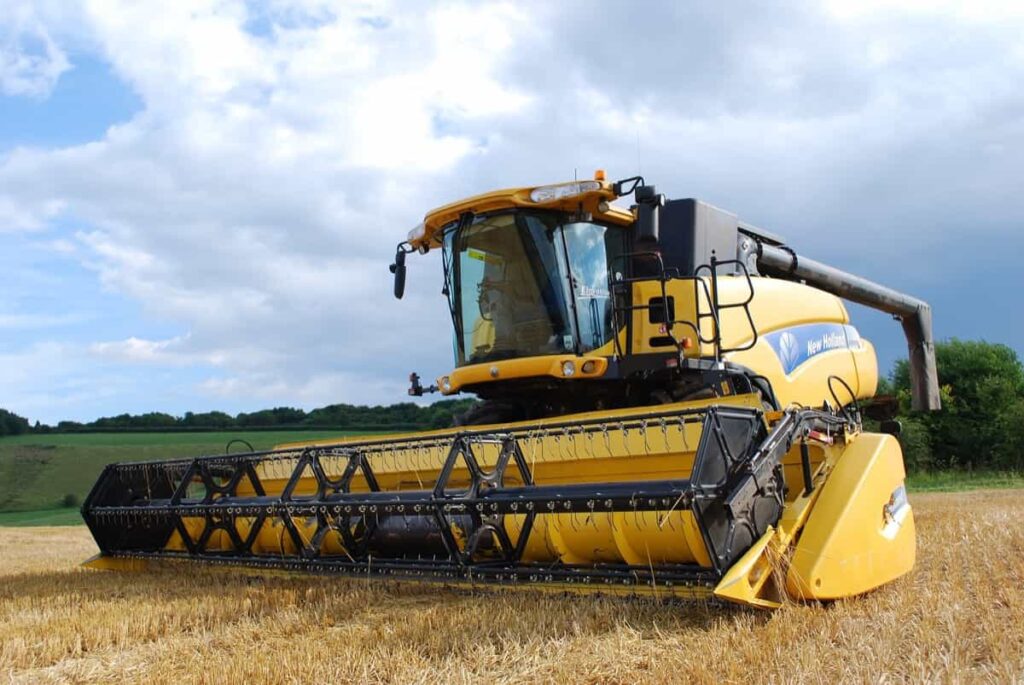
Farm power machinery management
What is farm power machinery?
Farm power machinery is any machinery or equipment used to perform a task on a farm. This can include everything from tractors and combine harvesters to smaller equipment like tillers and sprayers. Good management of farm power machinery is essential to the success of any farm operation. This includes ensuring that the machinery is properly maintained and operated and keeping accurate records of its use.
Importance of farm power machinery
The use of farm power machinery has increased dramatically in recent years as farmers seek ways to improve efficiency and productivity. Farm power machinery can help farmers save time and money by performing tasks more quickly and effectively than manual labor. Additionally, farm power machinery can help reduce soil compaction, improve crop yields, and minimize the need for herbicides and pesticides.
Types of farm power machinery
There are many different types of farm power machinery, each with its unique benefits and drawbacks. However, here are a few most common types of farm power machinery:
- Tractors: Tractors are one of the most versatile pieces of farm power machinery. They can be used for various tasks, including plowing, tilling, planting, and harvesting. However, tractors can be expensive to purchase and maintain.
- Combines: Combines are used to harvest crops such as wheat and corn. They are very efficient at gathering large amounts of crops in a short amount of time. However, combines can be difficult to operate and require significant effective training.
- Sprayers: Sprayers are used to apply pesticides and herbicides to crops. They are very effective at delivering these chemicals to the target area. However, sprayers can be dangerous to operate if not used properly, and they can also damage delicate crops if not used correctly.
In case you missed it: Farming with Animals: How to Start, Business Plan, Cost, Profit, and Benefits
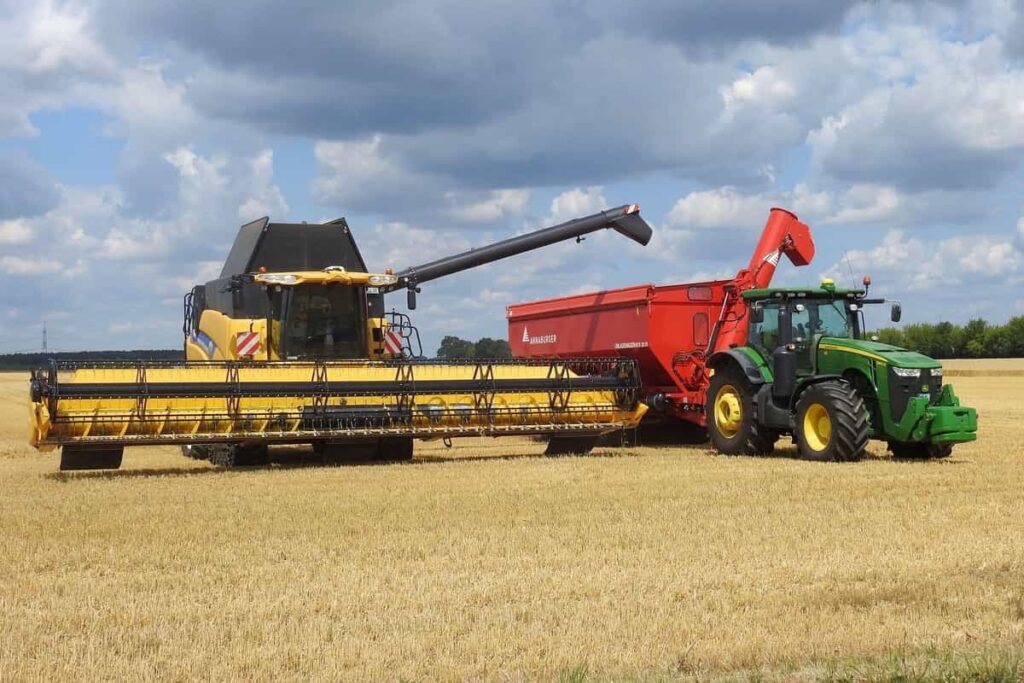
What is farm machinery implementation?
Farm machinery implementation is the process of putting into operation and using machines on a farm. This may include anything from operating and maintaining tractors to using other equipment such as tillers, harvesters, and planting machines. Good farm machinery management practices can help farmers save time, money, and labor.
Different types of farm power machinery
There are many different types of farm power machinery, each with its unique features and benefits. Here is an overview of some of the most popular types of farm power machinery:
- Tractors: Tractors are one of the most versatile pieces of farm machinery and can be used for various tasks such as plowing, tilling, hauling, and more.
- Combines are used to harvest crops such as wheat, corn, and soybeans. They typically have a large threshing drum that separates the grain from the plant material.
- Harvesters: Harvesters are used to harvest fruits and vegetables. They typically have a conveyor belt that carries the produce to a waiting truck or trailer.
- Plows: Plows are used to prepare fields for planting. They loosen up the soil and discard crop residue from the previous year.
- Disk Harrows: Disk harrows break up clumps of dirt and rocks, making them ideal for preparing fields for planting.
How to select farm power machinery
There are a few things to consider when selecting farm power machinery. The first step is to identify the purpose of the machine. Will it be used for tilling, planting, harvesting, or other purposes? Once the purpose is determined, research different models and brands to find the best fit. Consider the size of the machine and how well it will maneuver in the field.
Also, think about the fuel type best suited for the machine. Some machines may require special attachments, so factor those in. Get input from other farmers or agricultural experts to get their thoughts on which model would be best for your needs. Ultimately, select a well-built machine that will function properly for the intended purpose.
In case you missed it: How to Start Goat Farming in Bangladesh: Business Plan, Breeds, Cost, Profits, and Requirements
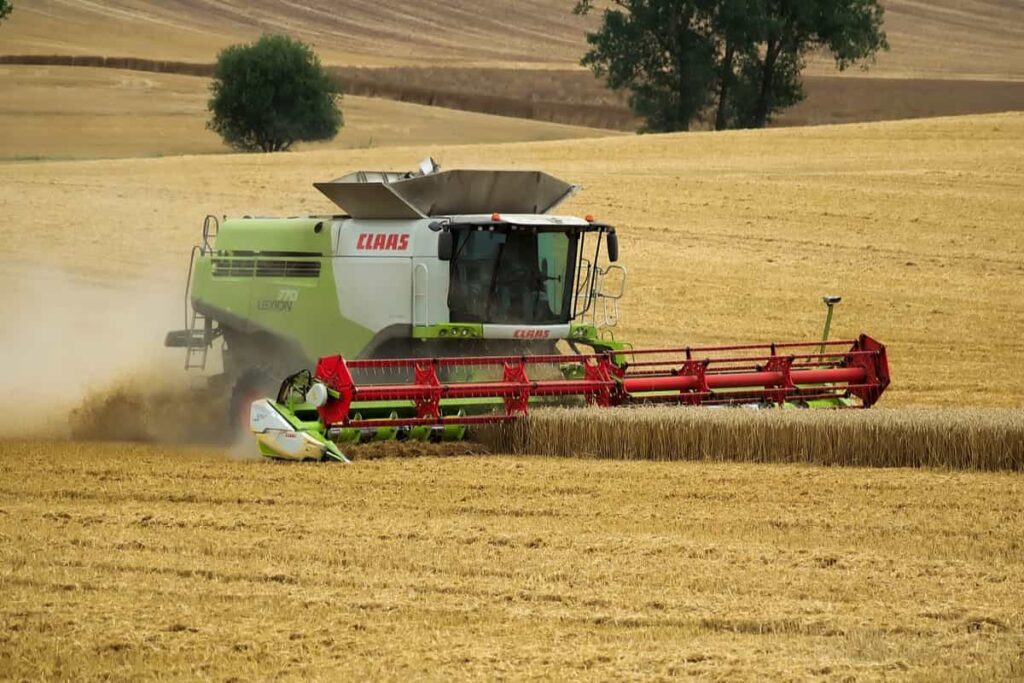
Cost of farm power machinery
Farm power machinery costs are a major consideration for farmers when deciding on their farms. Farm power machinery is a significant investment for any farmer. The cost of farm power machinery can vary significantly depending on the type and size of the machinery. The type of machine needed will depend on the crops grown and the farm’s size. The climate and terrain of the farm will also affect the type of machine needed.
Farmers should consult agricultural equipment dealers to get an idea of the type of machine best suited for their farm. Smaller farm power machinery, such as a tractor, can cost between $15,000 and $30,000. Larger farm power machinery, such as a combine harvester, can cost upwards of $100,000. Farm power machinery costs also vary depending on the brand and model. Some brands and models are more expensive than others.
Therefore, it is important to research to find the best deal on the right machinery for your needs. There are a few ways to finance the purchase of farm power machinery. Many farmers take out loans to finance their purchases. Others may lease their machinery or enter into a contract with a company that provides power farming services. No matter how you finance your purchase, the cost of farm power machinery is a significant investment that should be carefully considered before making a purchase.
How to operate farm power machinery
To operate farm power machinery, there are a few things you need to keep in mind. First, always read the operator’s manual before operating any machinery. You must familiarize yourself with the controls and safety features of the machine you will be operating. Next, always thoroughly inspect the machine before starting it up. Look for damaged or lost parts that could cause problems while using the machine.
Also, ensure all safety guards are in place and functioning properly. Once you have checked the machine, you can start it up. Farmers must know how to operate farm power machinery safely and correctly. Improper operation of this equipment can lead to serious injuries or even death. The following tips on operating farm power machinery:
In case you missed it: Lobster Farming Business Plan: Cultivation Practices, Breeding to Harvesting

- Farmers should read the manual and become familiar with the controls before operating any machine.
- When operating a machine, always be aware of your surroundings and keep clear of bystanders.
- Wear appropriate clothing when operating farm power machinery, including long pants, closed-toe shoes, and gloves.
- Never leave a machine running unattended. If you must leave the area, shut off the machine first.
- Be cautious when backing up a machine, as running over obstacles or people behind you is easy.
- Always follow the manufacturer’s safety guidelines when operating farm power machinery.
Pros and cons of farm power machinery
Regarding farm power machinery, there are pros and cons to consider. On the plus side, farm power machinery can save time and labor. Additionally, it can help improve crop yields and allow for more efficient use of inputs. On the downside, farm power machinery can be expensive to purchase and maintain.
Additionally, it can be dangerous to operate if proper safety precautions are not followed. When deciding whether to use farm power machinery, weigh the pros and cons carefully. Consider your specific needs and circumstances. If you have any questions or concerns, consult a qualified professional before making a final decision.
What are the benefits of farm power machinery?
The use of farm power machinery can result in several benefits for farmers, including increased efficiency and productivity, as well as reduced labor costs. In terms of efficiency and productivity, using farm power machinery can help farmers get more work done quickly. This can free up farmers’ time to focus on other aspects of their business or enjoy some much-needed downtime.
In case you missed it: How to Care for Your Pigs in the Frost: Cold Management in Pig Farming
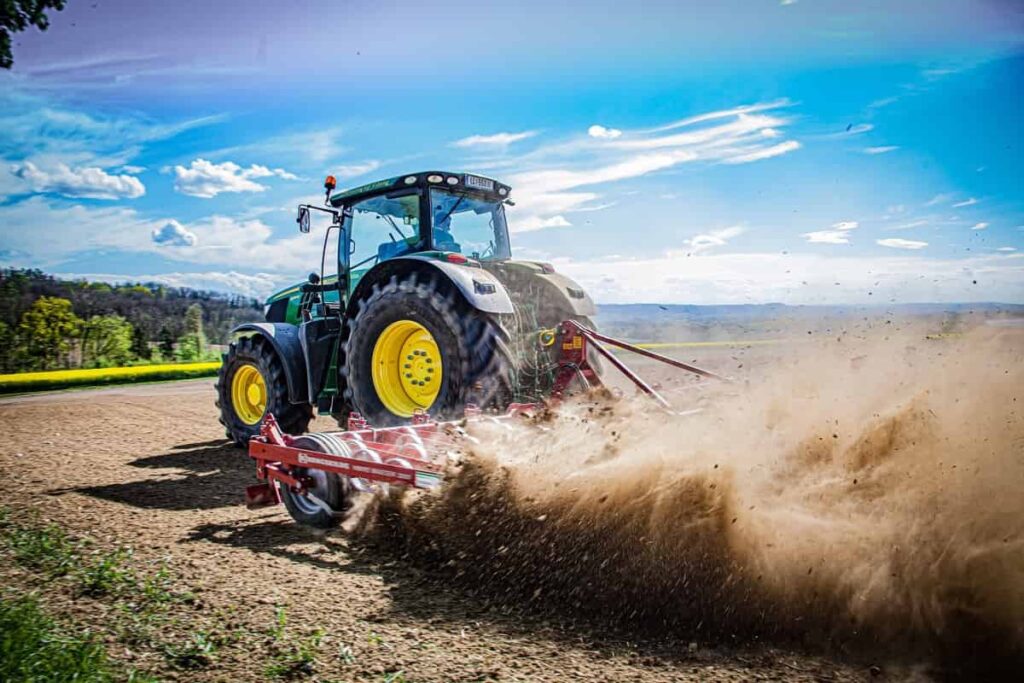
Additionally, by using machinery to complete certain tasks, farmers can reduce the chances of error and improve the quality of their work. Another benefit of farm power machinery is that it can help to reduce labor costs. By using machines to complete tasks traditionally completed by hand, farmers can save money on labor costs. Additionally, machine-assisted farming can help to improve working conditions for employees by reducing the amount of manual labor required.
How to properly manage your farm power machinery
To ensure your farm power machinery is properly managed, there are a few key things you should do:
- Keep up with maintenance and repairs. This will help prolong your equipment’s life and prevent unexpected breakdowns.
- Follow the manufacturer’s recommendations for operating your machinery. This helps you get the most out of your equipment and avoid damage.
- Keep track of your fuel usage and costs. This will help you budget for future purchases and keep your overall costs down.
- Store your machinery properly when not in use. This will protect it from the elements and prevent unauthorized use.
By following these simple tips, you can be sure that your farm power machinery is properly managed.
Benefits of farm power machinery
Farm power machinery has many benefits that make it a valuable tool for farmers. It can help increase crop yields, reduce labor costs, and improve farm safety. Crop yields can be increased with the use of farm power machinery. This is because the machine can help with planting, watering, and harvesting tasks. The machine can also help to remove weeds and pests from the crops.
In case you missed it: Cinnamon Farming Business Plan: A Profitable Production Guide for Beginners
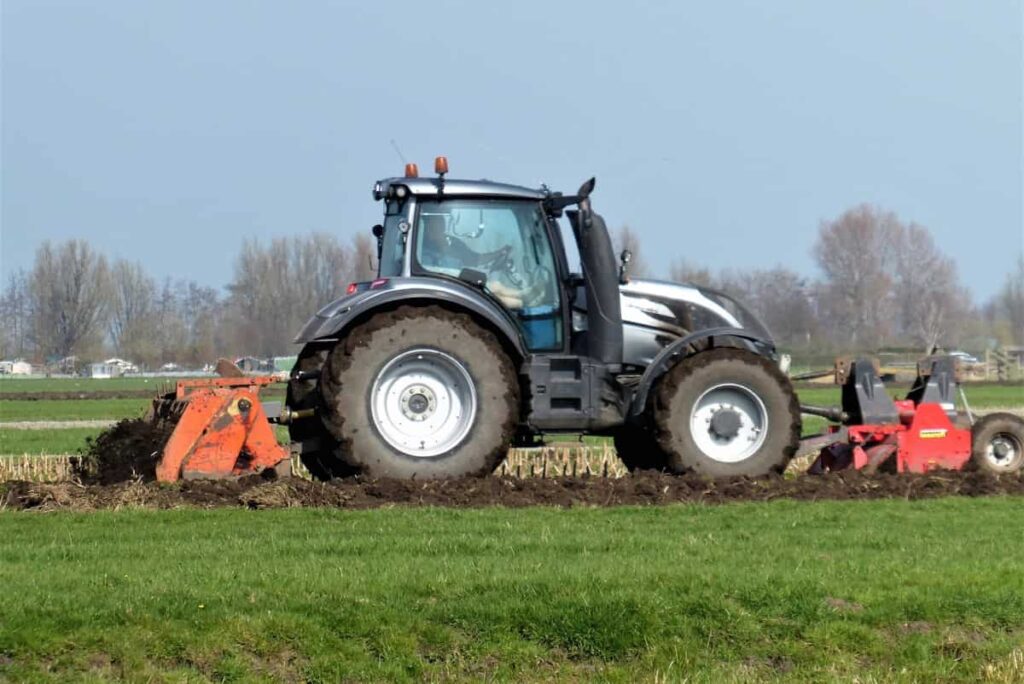
Labor costs can be reduced with the use of farm power machinery. This is because the machine can do many tasks normally done by human workers. This means that fewer workers are needed to operate the machinery. Farm safety can be improved with the use of farm power machinery. This is because the machine can help avoid accidents if humans are doing the work. For example, the machine can clear field debris before people enter them.
Conclusion
The use of farm power machinery has increased exponentially in the last century. The management of this machinery is essential to the efficiency of the farm. There are many ways to manage farm power machinery, but the most important thing is to have a plan. A good plan will help you make the most of your resources and get the job done right.
- Crops Grown in Summer Season: Best Choices for Summer Gardening
- Organic Pest Control for Tomato Farming
- How to Maximize Sheep Farming Profit
- Broccoli Varieties: Choosing the Right Cultivars for Your Farm
- How to Raise Pigs in Your Own Backyard: A Comprehensive Guide
- Budget Friendly Sheep Shed Ideas: Cheap and Low-Cost Tips
- How Much Do Cattle Farmers Make: Revenue Streams in Cattle Farming
- Management Pests and Diseases in Your Cotton Field
- Sheep Farming Business Plan for Beginners
- Aquaponic Farming at Home: A Step-By-Step Guide
- Profitable Village Farming Business Ideas in 2024
- High-Yield Aquaculture: Fast-Growing Fish for Farming
- Effective Fish Pond Construction Techniques for Beginners
- Irrigation and Water Management in Pineapple Farming
- Blossom to Harvest: Mastering Flowering and Pollination in Papaya Farming
- Pig Fattening Essentials: From Selection to Sale for Beginners
- Raising Wagyu Cattle: A Complete Guide for Premium Beef Production
- Soil Types and Their Water Holding Capacity
- Optimizing Irrigation Schedules for Coconut Groves for Enhanced Yield
- Espresso Your Garden: Coffee Grounds for Healthier Acid-Loving Plants
- The Best Soil Mix for Snake Plants: How to Mix Your Own Snake Plant Soil
- Green Thumb Success: Expert Tips for Cultivating Greenhouse Beans All Year Round
- Bloom All Year Round: The Ultimate Guide to Indoor Hyacinth Care
- Eco-Friendly Gardening: How to Make Liquid Fertilizer from Kitchen Waste
- Ultimate Guide to Grow Anise in Pots: Explore Seed Propagation to Harvesting
- Guide to Raising Chester White Pigs: Discover Breed Facts to Growth Management
- Mastering the Elegance: The Ultimate Guide to Weeping Cherry Tree Care, Planting, and Maintenance
- Ultimate Guide to Planting Garlic in Grow Bags: Growing Strategies for Beginners
- How to Fix Spider Plant Leaf-Related Problems: Natural and Organic Remedies
- 10 Reasons Why Your Tulsi Plant is Shedding Leaves: Home Remedies and Solutions
- Optimizing Growth and Yield: The Advantages of Palm Bunch Ash Fertilizer
- Utilizing Neem Oil Extract as a Natural Pesticide for Hydrangea
- From Soil to Harvest: Various Ways in Which Farmers Can Use AI Tools
- Steps to Encourage and Induce Citrus Flowers: A Comprehensive Guide
- How to Fix Snake Plant Leaf-Related Issues: Natural and Organic Remedies
- Transform Your Garden into a Fragrant Oasis with Raat Ki Rani (Night Blooming Jasmine)
